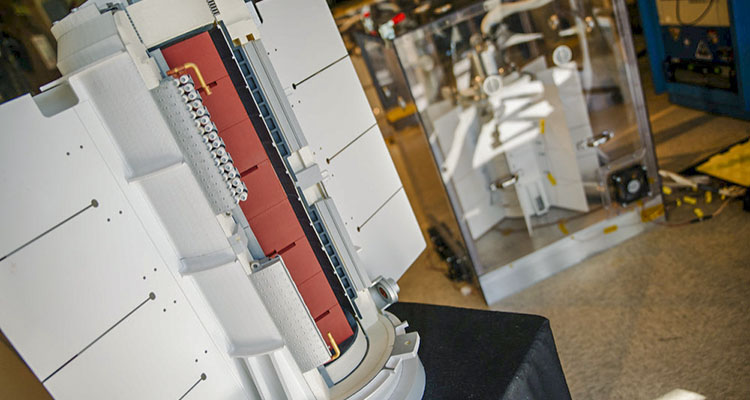Advanced High-Temperature Materials

Ensuring Performance in Extreme Conditions
UDRI Advanced High-Temperature Materials researchers engage in the characterization, life prediction, and testing of ceramic and refractory materials. We can evaluate the strength, fracture, fatigue, creep, and thermophysical properties of materials in varying atmospheric environments and temperatures up to 1500 degrees Celsius.
Our focus areas include studies of ceramics, metal, ceramic matrix composites, thermoelectric materials, carbon-carbon composites, optical ceramics, thermal barrier coatings, and optical coatings. UDRI is a nationally-known leader in the mechanical and thermophysical characterization of high-temperature ceramic materials.
See how UDRI researchers conduct high-temperature characterization of a wide array of materials
Capabilities
- Armor Materials
- Biomechanics and Biomaterials
- Chemical Compatibility and Radiation Effects on High-Temperature Materials
- Ceramics and Glass Development and Processing
- Ceramics Summary and Design Data Files (Compendium)
- Digital Library of Ceramic Microstructure
- High-Temperature Creep & Stress Rupture
- High-Temperature Materials Characterization
- Mechanical and Thermophysical Testing of Beryllium Oxide (BeO)
- Subsurface Damage Characterization Laboratory (SDCL)
- Thermal Analysis
- Thermal Cycle Fatigue Testing of Coatings
Contact us today and let us help with your challenges in materials performance.
Contact Us: 937-229-2113 | E-Mail | Form
Top: Working thermal models of the Multi-Mission Radioisotope Thermoelectric Generator (MMRTG), which is used to power the Mars Rover Curiosity. The MMRTG converts heat created by naturally decaying plutonium radioisotopes into electricity to power the rover’s instruments, computers, wheels, robotic arm, and radio. UDRI's Advanced High-Temperature Materials researchers design and run experiments to provide NASA with critical information related to Curiosity’s continued exploration, as well as in support of Mars 2020 and other future missions. Image credit: University of Dayton
